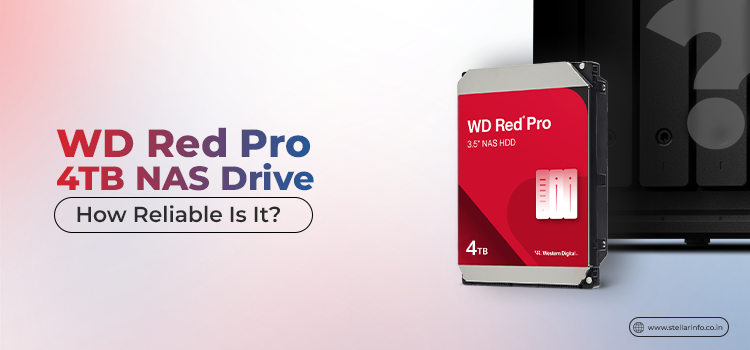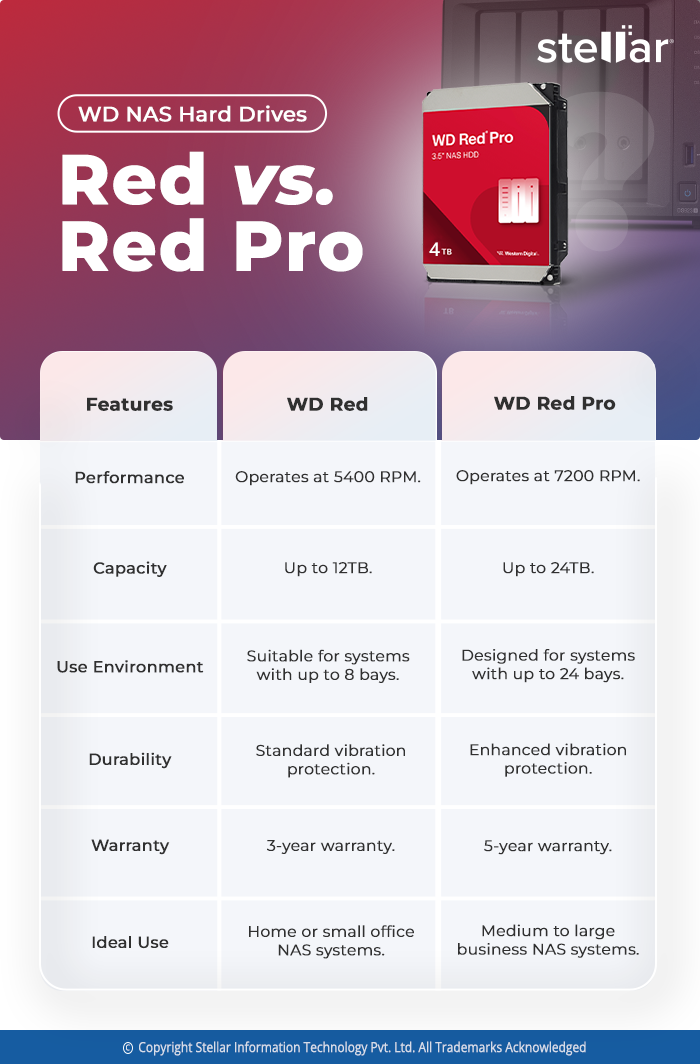WD, or Western Digital, is a well-known name among hard drives. Their special range of NAS (Network Attached Storage) hard drives, like the WD Red Pro 4TB, are designed for robust and reliable performance.
NAS drives need to be reliable because they store critical data and often run 24/7. Reliability ensures your data is safe and accessible whenever you need it. That's why understanding the reliability and performance of the WD Red Pro 4TB NAS drive is crucial.

Let’s get started.
What are NAS Drives?
NAS stands for Network Attached Storage, which refers to storage devices that connect to a network, allowing multiple computers to access and share files seamlessly.
NAS drives are specifically designed for these systems, offering several advantages over regular PC hard drives. While you can use a standard hard drive in a NAS system, specialized NAS drives, like the WD Red Pro 4TB,
provide better performance and reliability. These drives are built to withstand higher temperatures, have longer lifespans, and are better protected against vibration. Consequently, NAS drives are significantly less likely to fail compared
to regular PC hard drives, making them a preferred choice for storing critical data.
Now that you understand the importance of using specialized NAS drives, let's look closely at Western Digital's hard drive lineup.
Western Digital Hard Drive Lineup
WD has eight main lines of hard drives; here is a table explaining them.
| Series | Description | Ideal Use | Type |
| WD Blue | General purpose, all-round performance. | Suitable for everyday computing needs. | Internal |
| WD Green | Similar to Blue, slightly lower performance. Most eco-friendly. | A budget-friendly option for basic storage. | Internal |
| WD Black | High performance for gaming, media, and content creation. | Demanding applications like gaming and editing. | Internal |
| WD Red Pro NAS Drive | Optimized for NAS systems. | Network Attached Storage systems. | Internal |
| WD Surveillance Drive Purple | Designed for surveillance, capable of operating 24/7. | Surveillance systems. | Internal |
| WD Gold | Premium performance for data centers. | Datacenter-specific applications. | Internal |
| My Passport | Portable storage with automatic backup and password protection. | Secure and portable personal storage. | External |
| Elements | Simple, fast, and portable. | Quick and portable storage solutions. | External |
As you can see, the “Red” range of drives is purpose-built for NAS systems.
A common question is how WD Red drives compare to WD Black drives for NAS use. Indeed, WD Black drives generally offer better performance than their Red counterparts. However, we advise against using WD Black or other non-NAS-specific
hard drives in NAS systems. Accepting a slight performance trade-off for the benefits of drives designed specifically for NAS operations. The WD Red Pro 4TB NAS hard drive, for example, is built to handle the unique demands
of NAS environments, as is the WD Red 3.5 SATA 4TB NAS drive.
You might also wonder about the differences between "Red" and "Red Pro" drives. We'll delve into that in the next section.
WD NAS Hard Drives: Red vs. Red Pro
As the name suggests, the Red Pro is a beefed-up version of WD’s regular “Red” line of drives from WD. While both “Red” and “Red Pro” drives are designed for NAS systems, the latter offers some key improvements.
These differences are outlined in the following table.

In short, the WD Red Pro version is specifically engineered for higher-demand scenarios, offering better performance, higher capacities, and greater reliability for medium—to large-sized businesses.
The most popular version of the Red Pro is the WD Red 4TB NAS drive.
So let's talk specifics about the WD Red Pro 4TB NAS hard drive.
The WD Red Pro 4TB NAS Hard Drive
The WD Red Pro 4TB NAS hard drive is an excellent choice for NAS systems. These drives and the regular WD Red 4TB NAS drives offer a perfect balance of performance, reliability, and cost.
Their capacity is large enough for business operations and can reach a maximum size of 14 to 18 TB. Even the regular WD Red 4TB NAS hard disk drive operates at 5000+ RPM. The pro version is 40% faster, operating at
7,400 RPM.
The WD Red Pro 4TB NAS hard drives are quite reliable for storing lots of data safely, especially in business settings.
Here are a few reasons.
- Fast and Strong: The drives work quickly, which means they can handle a lot of information at once without slowing down. This is great for businesses that need to access their data constantly.
- Built Tough: The WD Red 4TB NAS hard drives (and others in the lineup) are made to handle shakes and bumps better than “regular” drives like the blue or green. When lots of drives are used together, they can shake each other, but the WD Red and Red Pro can take this without getting damaged.
- Warranty-Protected Longer than Others: The 4TB WD Red NAS comes with a 5-year warranty, which is longer than many other hard drives. In contrast, when you compare drives from Toshiba NAS vs. WD Red, you’ll see that Toshiba drives only come with a 3-year limited warranty. This shows that WD believes your Red NAS drive will last a long time, and they stand behind their product.
- Made for Constant Use: The WD Red Pro is designed to work well all day, every day. This is important for businesses that use their drives often and can't afford interruptions. Even if a drive fails, which is uncommon, these drives are compatible with data recovery software and data recovery services, ensuring that your data can be retrieved with ease. This makes the WD Red Pro a dependable choice for maintaining smooth operations and safeguarding critical information.
Overall, the WD Red Pro 4TB NAS hard drive is a dependable choice for businesses that need a hard drive that is fast, tough, and designed for heavy use. It is a worthwhile expense, especially when you stack it up against competitors
with higher price points and lower performance and warranty.
This article on the WD Red 4TB NAS. We hope you found it useful, and we’ll see you in the next one.
If you have any questions, do leave them in the comment section below. An expert from our team will answer them shortly.
FAQs
The WD Red lineup offers a variety of sizes to meet diverse storage needs. Here are the options available:
- WD Red 2TB NAS Hard Drive: Ideal for smaller NAS systems or entry-level users.
- WD Red 3TB NAS Hard Drive: A step up in storage capacity, suitable for moderate use.
- WD Red 3TB NAS Hard Drive: Similar to the NAS 3TB but with an emphasis on its hard drive utility.
- WD Red 8TB NAS Hard Disk Drive: Great for larger data requirements and intensive use.
- WD Red 10TB NAS Hard Drive: Offers ample space for extensive data storage needs.
- WD Red 12TB NAS Hard Drive: The highest capacity in this list, perfect for large-scale data operations.
The WD Red Pro lineup offers various capacities suitable for various data needs. Here are your options.
- WD Red Pro 2TB NAS Drive
- WD Red Pro 4TB NAS Drive
- WD Red Pro 6TB NAS Drive
- WD Red Pro 8TB NAS Drive
- WD Red Pro 10TB NAS Drive
- WD Red Pro 12TB NAS Drive
- WD Red Pro 14TB NAS Drive
- WD Red Pro 16TB NAS Drive
- WD Red Pro 18TB NAS Drive
- WD Red Pro 20TB NAS Drive
- WD Red Pro 22TB NAS Drive
- WD Red Pro 24TB NAS Drive
High temperatures can reduce the lifespan of any hard drive. WD Red Pro drives are designed with enhanced heat resistance to cope with the demands of a NAS system, which often operates continuously. However, proper ventilation and cooling in the NAS enclosure are recommended to maintain optimal performance and extend the life of the drives.
WD Red Pro drives are slightly louder than standard WD Red drives due to their higher spinning speeds. This noise can be noticeable in quiet environments but is generally well within acceptable levels for most business and home office setups.
About The Author

Online Marketing Expert & Content Writer












